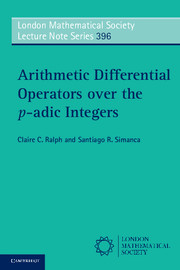Book contents
- Frontmatter
- Contents
- 1 Introduction
- 2 The p-adic numbers ℚp
- 3 Some classical analysis on ℚp
- 4 Analytic functions on ℤp
- 5 Arithmetic differential operators on ℤp
- 6 A general view of arithmetic differential operators
- 7 Analyticity of arithmetic differential operators
- 8 Characteristic functions of discs in ℤp: p-adic coordinates
- 9 Characteristic functions of discs in ℤp: harmonic coordinates
- 10 Some differences between δ-operators over ℤp and ℤurp
- References
- Index
5 - Arithmetic differential operators on ℤp
Published online by Cambridge University Press: 05 February 2012
- Frontmatter
- Contents
- 1 Introduction
- 2 The p-adic numbers ℚp
- 3 Some classical analysis on ℚp
- 4 Analytic functions on ℤp
- 5 Arithmetic differential operators on ℤp
- 6 A general view of arithmetic differential operators
- 7 Analyticity of arithmetic differential operators
- 8 Characteristic functions of discs in ℤp: p-adic coordinates
- 9 Characteristic functions of discs in ℤp: harmonic coordinates
- 10 Some differences between δ-operators over ℤp and ℤurp
- References
- Index
Summary
In going further, we now make a fundamental use of Theorem 2.12 to introduce the notion of arithmetic differential operators over the ring ℤp. This is the essential idea in our work here. In the following chapter, we shall present the theory of these operators in general, discussing the jet spaces whose global sections give rise to them. We shall even expand our explanations to outline the general theory in the case of multiple primes, something that we start also in a simplified manner here. But when we revisit the study of these operators in the remaining chapters, there will be little that we will do beyond our discussion of them over the ring ℤp until the very end. In the very last chapter, we compare the behaviour of these operators over the p-adic integers with their behaviour over its unramified completion.
The idea leading to arithmetic operators embodies a radically different philosophy from that used up until now. This philosophy arises naturally when looking at the p-adic numbers in the setting of the analytic functions of the previous section. For we treat p-adic numbers now as functions, albeit functions on a space of “dimension zero.” These functions all admit the representation (2.4), and so they ought to be considered analytic since these representations are convergent power series in p. Once we agree with the idea of the p-adic numbers as “analytic” functions, it is then only natural to define their derivatives, the arithmetic derivatives of our work.
- Type
- Chapter
- Information
- Publisher: Cambridge University PressPrint publication year: 2012



